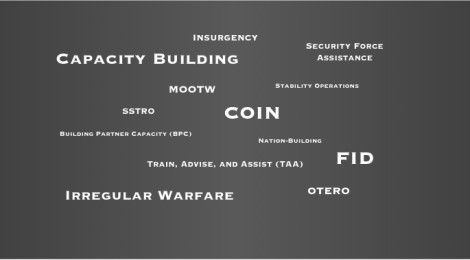http://warontherocks.com/2013/

THREATS AND THE WORDS WE USE: A THOUGHT EXPERIMENT
November 8, 2013 · in Commentary and Analysis
All forms of warfare: nuclear, conventional, and unconventional are complex and the US must adequately prepare for them all, balancing the training and resourcing for each. Perhaps most important policy makers and strategists must possess the intellectual rigor to understand, explain and address these threats with policies and strategies that will serve US interests. To illustrate this I offer this thought experiment.
Pull out a pad of paper or open a blank word document.
Now, choose any threat in the world that the United States or its allies face, from Al Qaeda to Iran to drug cartels to North Korea to Syria, to Boko Haram or Al Shabaab or any other threat of interest and importance.
Once you’ve chosen your threat, list American interests vis-à-vis that state or movement and then list the strategic aim(s) that will support those interests. Next, determine the end state required to achieve the strategic aim. Third, identify the operational objectives that will produce the end state. Then determine the sequence of actions most likely to achieve the operational objectives. Finally, organize and apply the resources of the government agencies to include the military to accomplish the sequence of actions.
Now, go back and see if you used any military doctrinal terms or defense-speak buzzwords. If you have, go back and start over. You can only use common English words that people outside of the defense community will be able to understand.
If you manage this, your strategy will be understood by military and civilian officials, by friends, partners, or allies, but also, and perhaps most importantly, by the American press and public. You will likely have described elements of insurgency and counterinsurgency (COIN), stability operations, and unconventional warfare, among others – without actually using those terms, which are too often deployed as shortcuts that allow us to circumvent deep and clear thinking. And you will have thought more deeply about the strategy necessary to address the threat.
You might now be thinking, why do we use these terms at all?
Carl von Clausewitz, the Prussian philosopher of war so often cited here at War on the Rocks, wisely counseled that before you embark on war you must first understand it. In American military circles, we have flipped that on its head and instead first rush to brand it with an acronym-friendly term to fight it before we truly grasp the characteristics of the conflict. The great strategic thinker, Colin Gray once wrote “The American defense community is especially prone to capture by the latest catchphrase, the new-sounding spin on an ancient idea which as jargon separates those who are truly expert from the lesser breeds without the jargon.” Thus were born (or actually reborn in the case of COIN) such terms as Irregular Warfare, Insurgency and COIN, Nation-Building, Stability Operations; Stability, Security, Transition, Reconstruction Operations (SSTRO); Military Operations Other Than War (MOOTW); Capacity Building; Organization, Training Equipping, Rebuilding and Advising (OTERO); Security Force Assistance (SFA), Building Partner Capacity (BPC), Train, Advise, and Assist (TAA), and the Direct and Indirect. All of the above new sounding catchphrases are grounded in ancient human ideas and activities.
This brings us to what I like to call the “COIN pendulum,” which I believe is about to swing again. Consider the ends of the pendulum swing since 1975. Two anecdotes will illustrate the distance between the two.
In the 1980’s one of my mentors was asked to resurrect a COIN course at Fort Leavenworth. He contacted various Army schools and talked to doctrine writers and librarians and was told that after 1975 they were directed by “higher authority” to remove all COIN materials from their files, thanks to Vietnam’s supposed discrediting of COIN doctrine. The only school that maintained some form of COIN doctrine was the US Army John F. Kennedy Special Warfare Center and School. However, it was no longer referred to as COIN, but rather as Foreign Internal Defense (FID). Some prescient action officer at Fort Bragg helped to protect COIN theory and doctrine by renaming it and putting it in the proper perspective:
FID turned out to be a very useful doctrinal concept that has major advantages when compared to the “third-party” counterinsurgency campaigns of Iraq and Afghanistan. The FID approach is focused on providing external support to the host nation government counter its own insurgency rather than external forces conducting COIN themselves. It provides an option for policy makers and strategists to employ Ameircan military forces (both conventional and special operations) in ways that do not require a large footprint or the “expeditionary COIN” conducted in Iraq and Afghanistan.
Swing forward to the post-9-11 era.
(Continued at War On The Rocks at the link below)
“Thus it has come about that our theoretical and critical literature, instead of giving plain, straightforward arguments in which the author at least always knows what he is saying and the reader what he is reading, is crammed with jargon, ending at obscure crossroads where the author loses its readers. Sometimes these books are even worse: they are just hollow shells. The author himself no longer knows just what he is thinking and soothes himself with obscure ideas which would not satisfy him if expressed in plain speech.”
ReplyDeleteMajor General Carl von Clausewitz